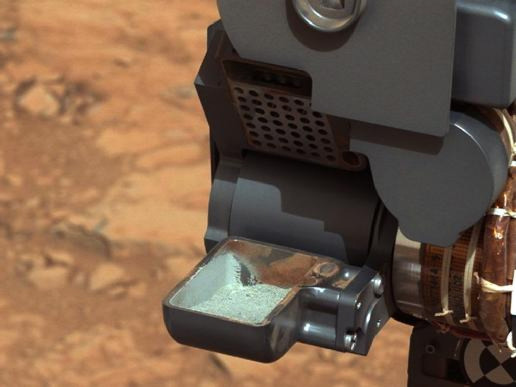NASA's Mars Rover Curiosity Put In 'Safe Mode' After Memory Glitch Detection In Main Computer; Explorations Halted Temporarily

NASA's Mars rover Curiosity has been temporarily put to “safe mode” as the scientists from Earth are attempting to fix a memory glitch, NASA said in a statement.
Curiosity’s explorations in the Martian surface have been suspended following the computer glitch, but the car-sized rover is in contact with Earth. Scientists have switched to a backup computer Thursday as the original computer’s flash memory developed problems early this week.
"We switched computers to get to a standard state from which to begin restoring routine operations," said Richard Cook of NASA's Jet Propulsion Laboratory (JPL), the project manager for the Mars Science Laboratory Project, which built and operates Curiosity.
NASA’s Curiosity rover has a pair of redundant main computers and sub-systems named A-side and B-side, in order to have a backup available if one fails. At present, Curiosity is operating on B-side.
"While we are resuming operations on the B-side, we are also working to determine the best way to restore the A-side as a viable backup," JPL engineer Magdy Bareh, leader of the mission's anomaly resolution team said.
NASA said the trouble detected is related to corrupted memory at an A-side memory location used for addressing memory files and the spacecraft remained in communication with Earth but did not send any recorded data.
Restoring the rover to full operations mode will take a few days and the scientists are troubleshooting the condition that affected operations, NASA said. The science experiments will resume after the rover is back on full-operations mode.
Before the powering-down, the Mars rover Curiosity had began the process of analyzing portions of the first sample of rock powder ever collected from the interior of a rock on Mars. Two compact laboratories inside Mars rover Curiosity have ingested portions of the sample of rock, a NASA statement had said.
Mars Science Laboratory is part of NASA's Mars Exploration Program and is a long-term effort to find traces of water and life that might have existed in the red planet and to study the Martian environment and to explore the possibility of a future manned mission.
© Copyright IBTimes 2024. All rights reserved.






















